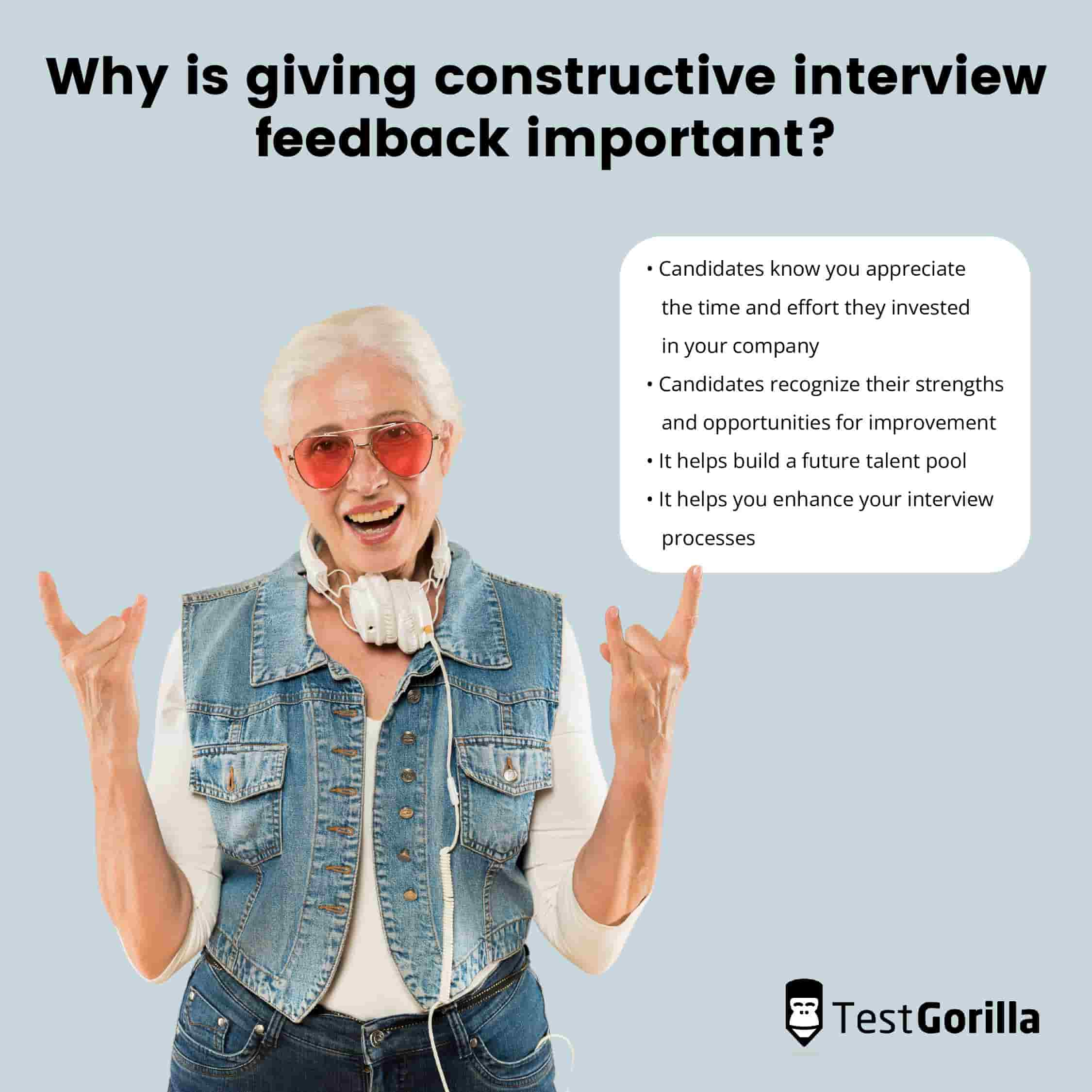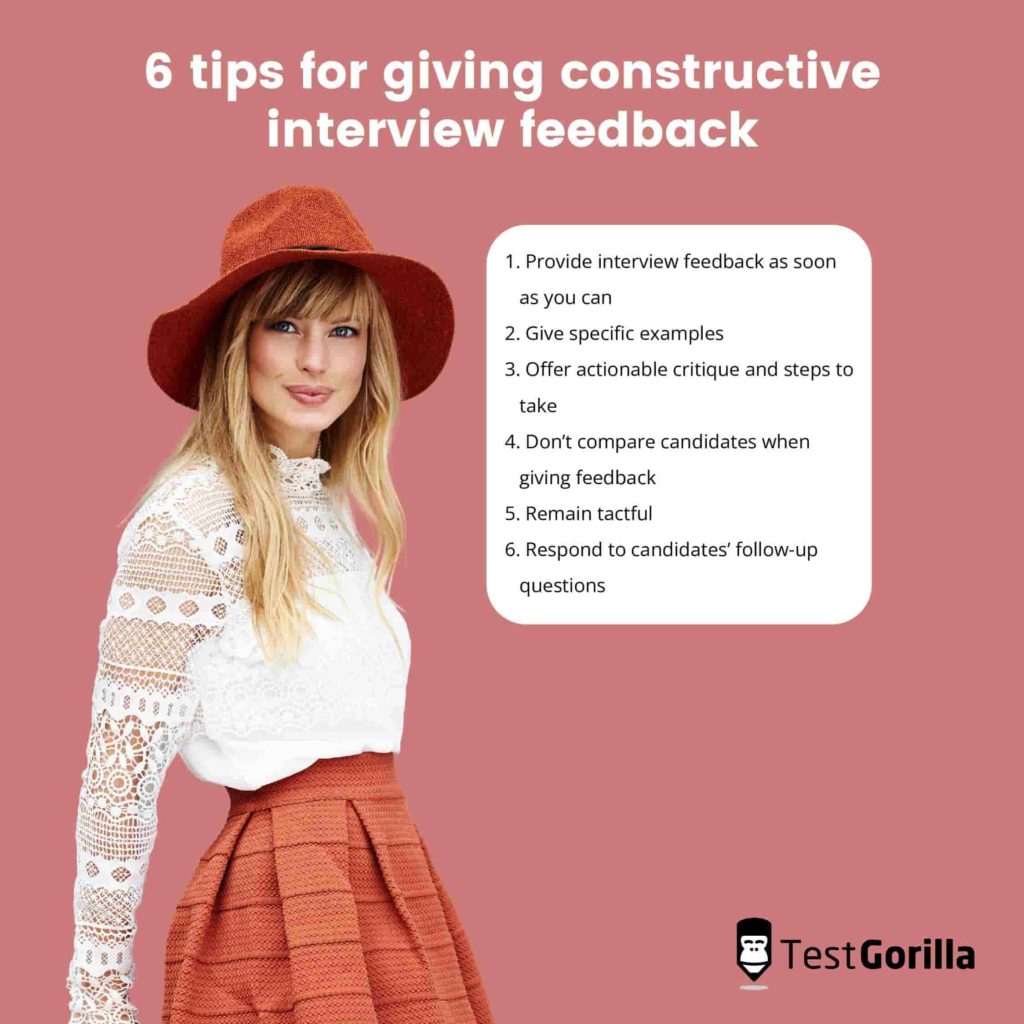6 tips for giving constructive interview feedback
You’ve spent weeks or maybe even months screening resumes, assessing skills, and conducting interviews, and now you’ve finally found the perfect person for your open role.
Once they’ve accepted your offer, you’re eager to start the onboarding process and integrate them into the company and team.
However, even though you’ve found the right person for the job, you can’t forget about the unsuccessful candidates who also went through your recruitment process.
In addition to onboarding your new hire, it’s also time to deliver the all-important constructive interview feedback to the candidates who didn’t quite fit your candidate profile.
You might be tempted to give all candidates the generic “You weren’t quite the right fit” spiel, but doing so would be a crucial mistake that could ruin an otherwise good candidate experience.
Here, we explore the importance of giving constructive interview feedback, explain how to evaluate candidates during an interview, and offer six tips to help you deliver valuable feedback to unsuccessful candidates.
Why is giving constructive interview feedback important?
A great candidate experience doesn’t always end with a job offer.
Although it’s disappointing not to make the cut, candidates appreciate companies that attempt to deliver a positive candidate experience throughout the entire process, including when the candidates are unsuccessful.
In fact, even though 94% of candidates want to receive feedback, only 41% claim to have received it in the past.
On top of this, word of mouth is powerful.
When organizations don’t provide a good candidate experience, candidates are likely to be vocal about it within their peer and professional networks, including LinkedIn or Glassdoor.
Here are just a few reasons why giving constructive interview feedback to unsuccessful candidates is important.
1. Candidates know you appreciate the time and effort they invested in your company
Candidates who have been through your hiring process have not only filled out a job application and crafted a cover letter but may have also completed skills tests, compiled presentations, and attended multiple interviews.
All of these steps involve a great deal of time and energy on the candidate’s part, so it’s a professional courtesy to offer them constructive interview feedback once you’ve made your final hiring decision.
Showing unsuccessful candidates that you respect their time and are willing to help them improve is an essential and courteous move.
Generic rejection emails can leave candidates feeling like their time and effort weren’t appreciated, which ultimately hurts your employer brand.
2. Candidates recognize their strengths and opportunities for improvement
Detailed feedback helps unsuccessful candidates understand exactly why they were unsuccessful.
Whether they had the right skills but didn’t perform well in the interview or had a great interview but didn’t have the required experience, providing them with this feedback helps them prepare for future interviews and plug any skills or experience gaps that you identified.
Giving unsuccessful candidates useful, personalized interview feedback lets them know that even though they weren’t the right fit this time around, you’re a thoughtful employer that’s committed to helping build people up and directing them to ways they can improve.
3, It helps build a future talent pool
Just because candidates didn’t fit your requirements this time around doesn’t mean that they won’t be suitable for a future role in your organization.
Unsuccessful candidates are much more likely to consider a future role within your organization if you provide them with constructive feedback, which also enables you to flesh out your talent pool.
4. It helps you enhance your interview processes
Providing constructive interview feedback can also help you as an interviewer.
Firstly, when you provide candidates with feedback, it gives you a chance to solicit feedback on the interview process from them, too.
Secondly, when you start to provide consistent feedback to candidates, you can glean insights into where you might be making mistakes in the interview process. For example, if otherwise qualified candidates are consistently failing to provide satisfactory answers to a specific question, it might be time to review the way you’re asking it.
How to evaluate candidates during an interview
Your ability to give constructive interview feedback depends on how efficiently you evaluate candidates during the interview process.
Here are a few tips for making the most out of candidate evaluations and forming a solid basis for constructive interview feedback.
1. Define your requirements
It’s impossible to properly evaluate candidates without first determining the most important candidate criteria.
Before the interview process begins, look back on the initial job description and role requirements, and list the skills, qualities, and experience a successful candidate must have.
Before the interview itself, you should also:
Prepare a list of standardized questions to ask each candidate
Review the candidate’s resume
Make sure all stakeholders agree on how to conduct the interview
2. Create an evaluation scorecard
An evaluation scorecard helps you keep track of the details of each of your candidate assessments, which is useful when providing interview feedback.
Create a checklist and rating system based on your candidate requirements, and leave space to write comments about each candidate that cover the following areas:
Skills: Does the candidate have the skills required for the position? Give examples that show they have each skill, including the results of any skills assessments.
Experience: What experience does the candidate have? Assess their job experience, industry-specific experience, and any other experience that is relevant to the open position.
Salary expectations: Do the candidate’s salary expectations align with your budget?
Culture add: How well do the candidate’s behaviors and values align with your organizational values?
Overall impression: Taking all of the above into account, what is your overall impression of the candidate? Give examples where possible.
3. Ask probing and role-specific questions
During the interview, focus on eliciting detailed answers relevant to the open role. You can’t plan out probing questions in advance, but you can include the following:
“Tell me more about…”
“In retrospect, what would you have done differently in this situation?”
“Can you give me another example?”
“How did the way you handled this situation impact the end result?”
In addition to learning about candidates’ previous experience, you’ll also want to assess their knowledge and skills relevant to the open role.
We’ve put together several interview-question guides to help you assess candidates for specific roles:
The best insights on HR and recruitment, delivered to your inbox.
Biweekly updates. No spam. Unsubscribe any time.
6 tips for giving constructive interview feedback
Now that we’ve gone through the importance of giving constructive interview feedback and how to evaluate candidates during the interview process, here are our top six tips for elevating your feedback process and providing a great candidate experience.
1. Provide interview feedback as soon as you can
The golden rule of giving interview feedback is to provide unsuccessful candidates with it as soon as you’ve made a firm hiring decision.
This ensures that the interview and recruitment process is still fresh in everyone’s minds and that the feedback is still relevant.
For example, if you wait a month from the interview date to provide feedback, the candidate may have attended many other interviews or even secured a role in another organization. Plus, keeping candidates waiting too long after they’ve invested time and effort into your recruitment process does not align with a good candidate experience.
2. Give specific examples
Rejection can be a hard pill to swallow, so it can be tempting to be vague when giving feedback.
However, giving constructive interview feedback is an integral part of a positive candidate experience, so citing clear and tangible examples of both strengths and weaknesses is a must.
For example, when referring to areas where the candidate fell short, don’t just tell them that they lacked enough experience in a certain area. Instead, try the following:
“This role requires someone who can deal with up to fifty client-facing interactions a month on top of other tasks, and we got the sense that you might not have dealt with this volume of interactions yet.”
This specific feedback gives a clear example of how the candidate could either polish their existing skills or better represent their level of experience in future interviews. You should also follow the same guidelines when delivering positive feedback.
3. Offer actionable critique and steps to take
Another crucial element of providing interview feedback to candidates is offering advice on areas they could improve in for future interviews. It’s important to provide them with actionable steps that they can take to become stronger candidates.
Not only can you suggest that they enroll in training programs or gain further credentials, but you can also share some observations you made during the interview.
For example, maybe they showed they have the skills necessary for the role but require more interview practice to get over their nerves. Or maybe they need to work on emphasizing the match between their skills and experience.
4. Don’t compare candidates when giving feedback
Comparing candidates is essential when you’re making final hiring decisions. However, avoid doing this when you’re providing interview feedback.
Simply telling unsuccessful candidates that there was a stronger candidate is not constructive. Instead, your feedback should be focused on the candidate you’re giving it to.
One of the main things to remember when giving interview feedback is that its purpose is to help unsuccessful candidates become stronger in the future.
5. Remain tactful
Again, giving constructive interview feedback is part of a good candidate experience. Therefore, you should avoid language that candidates could potentially regard as rude, disrespectful, or simply insensitive.
Every time you give feedback, try to put yourself in the unsuccessful candidate’s position and remember to give specific examples.
For example, if the candidate gave you a presentation that was comprehensive but not a great example of what you were looking for, don’t say, “Your presentation wasn’t up to scratch.”
Instead, aim for the following:
“Although we could see that you put a lot of thought and effort into creating a well-researched presentation, specific sections needed fleshing out to cover the full scope.”
You can then give them specific examples of the sections that required some improvement.
6. Respond to candidates’ follow-up questions
When you provide interview feedback, candidates will often have follow-up questions that you need to be prepared for.
Of course, how you give answers will depend on whether you’ve given feedback via email or the phone.
Both methods have their advantages. Although phone calls can often enable you to be more personable, emails give you more time to think about how to give constructive answers to follow-up questions.
Following the tips in this article will help you give unsuccessful candidates well-rounded, thoughtful, and timely feedback.
When faced with follow-up questions, keep your answers brief, stick to the same tips, and don’t veer outside of the feedback you’ve already given.
A formula for giving constructive interview feedback helps you provide a great candidate experience
If you’ve assessed candidates correctly throughout the recruitment and interview process, you’ve already got all of the information you need to provide constructive feedback to successful and unsuccessful candidates.
If you’re struggling to provide constructive interview feedback, you might need to refine your candidate assessment processes.
For example, you can use pre-employment tests to gain a more holistic view of candidates by assessing their skills and capabilities in various areas, including their role-specific skills, cognitive abilities, and situational judgment.
Combining the results of pre-employment tests and candidate information gathered during the interview stage provides you with a solid basis for giving constructive interview feedback.
TestGorilla’s skills-testing platform is home to bias-free candidate assessments that help you to not only get the lowdown on candidates but also give each candidate the feedback they deserve.
Get started for free today and start making better hiring decisions, faster and bias-free.
Related posts
You've scrolled this far
Why not try TestGorilla for free, and see what happens when you put skills first.
















